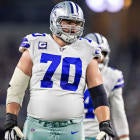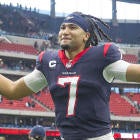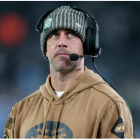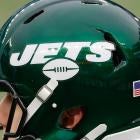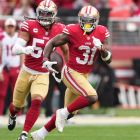Shaquille O’Neal. Alex Rodriguez. Miguel Cabrera. Kevin Garnett. Ken Griffey Jr. These baseball and basketball superstars of the 21st century were traded during their careers. Blockbuster trades involving superstars occur with more regularity in these sports than in the NFL.
Trading J.J. Watt might be given serious consideration if the Texans were an MLB or NBA team. On the surface, it seems like a ludicrous concept. Watt has won three of the past five NFL Defensive Player of the Year awards, including consecutive honors in 2014 and ‘15. He is the only player ever to have multiple seasons with 20 or more sacks. Watt is the closest thing to a modern day Reggie White, who is arguably the greatest defensive football player of all-time.
Why trading Watt isn’t a crazy idea
The idea of putting Watt on the trading block was almost unthinkable before the 2016 season. Watt only played in the first three games because he suffered a setback in returning too quickly from the back surgery for a herniated disc he had right before the start of training camp. A second surgery was necessary. Watt announced during Super Bowl week he had finished rehabbing his back and was cleared to resume football activities.
The Texans defense didn’t collapse during his lengthy absence. Healthy for the first time, defensive end Jadeveon Clowney started living up to the potential that made him the first overall pick in the 2014 NFL Draft. Surprisingly, The Texans gave up the fewest yards in the NFL last season.
The chart below illustrates the statistical difference in the Texans defense with a healthy Watt in 2015 and without in 2016.
| Year | Total (yards) | Passing (yards) | Rushing (yards) | Points allowed | Yards/ pass | Yards/ run | Takeaways | Sacks |
| 2015 | 310.2 | 210.4 | 99.8 | 313 | 6.6 | 4.1 | 25 | 36 |
| 2016 | 301.3 | 201.6 | 99.7 | 328 | 6.6 | 4.0 | 17 | 31 |
A strong defense carried a weak offense, which ranked 29th in total yards, to a second straight AFC South title despite a negative-49 point differential for the season. The Texans defeated a depleted Raiders squad in a wild-card game before losing to the eventual Super Bowl LI champion Patriots in the divisional round of the playoffs.
The Texans haven’t been legitimate Super Bowl contenders since Watt was taken with the 2011 draft’s 11th overall pick. Getting past the divisional round of the playoffs hasn’t happened despite Watt’s dominance. The playoffs have been missed twice, including during one of his Defensive Player of the Year seasons.
Since the defense is already formidable, dealing Watt might be a quick way to take the Texans to the next level by acquiring draft picks to improve a subpar offense.
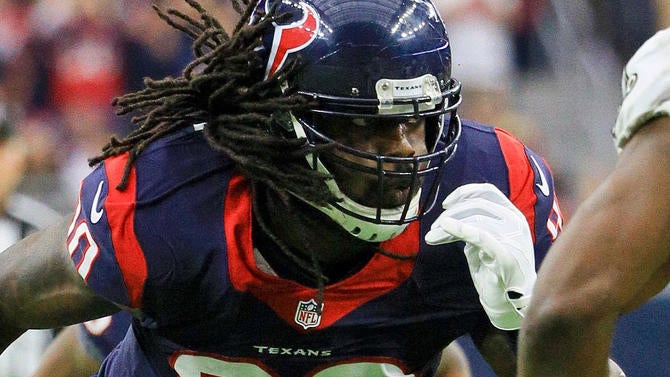
Watt’s contract and salary cap ramifications
Watt has five years left on the six-year, $100 million contract extension he received before the 2014 season, which made him the NFL’s highest-paid non-quarterback upon signing. He is scheduled to make a fully guaranteed $10.5 million next season. His unguaranteed 2018, ‘19, ‘20 and ‘21 salaries are $11 million, $13 million, $15.5 million and $17.5 million.
Watt is a tremendous bargain financially with $67.5 million over the remaining five years of his contract. Only $34.5 million is in the next three years.
Watt has a $14.5 million 2017 salary cap number. A total of $4.5 million of cap space would be gained by trading Watt. The Texans would be left with a $10 million cap charge for Watt because $6 million of bonus proration from his 2018 and ‘19 contract years would immediately accelerate onto Houston’s books.
The Texans are currently projected to have $25 million to $30 million of 2017 cap room depending where the salary cap is set. The NFL’s preliminary projections put the cap at between $166 million and $170 million.
Trading Watt would eliminate a looming financial quandary for the Texans. Clowney will likely receive an extension before the start of the 2018 regular season. Six defensive players have already surpassed Watt in the NFL’s salary hierarchy. He will continue to drop as more players that can consistently put pressure on opposing quarterbacks, such as Aaron Donald, Chandler Jones and Khalil Mack, sign new contracts.
Clowney’s deal would also be among those that should eclipse Watt. This will likely be problematic if Watt is anything close to his previous form in the future. The Texans would have to adjust or renegotiate Watt’s contract with multiple years remaining as well to avoid having a disgruntled cornerstone of the franchise.
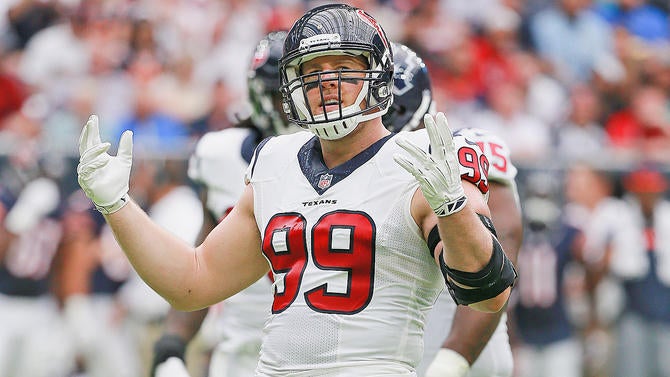
So what’s Watt’s trade value?
I consulted several NFL executives I have good relationships with to get a sense of the type of compensation the Texans might receive in a Watt trade. Their responses were made only under the condition of anonymity because commenting in this manner on a player under contract to another team probably runs afoul of the NFL’s anti-tampering policy.
The executives generally thought the idea has merit but had a hard time putting a value on Watt because players of his caliber don’t get traded in the NFL.
The consensus was Watt’s value would be more than teams received in substantial trades of veteran non-quarterbacks over the past decade provided concerns about his back injury could be alleviated. “Some of the picks would have to be conditional because backs can be tricky,” said one executive.
In 2008, the Chiefs received a first-round pick (15th overall) and two third-round picks in that year’s draft from the Vikings for defensive end Jared Allen, who had been given a franchise tag. A swap of 2008 sixth-round picks was also a part of the trade. The Vikings were on the receiving end of picks in 2013 when wide receiver Percy Harvin was dealt to the Seahawks -- a ‘13 first-round pick (25th overall), a ‘13 seventh-round pick and a ‘14 third-round pick. Cornerback Darrelle Revis was also dealt from the Jets to the Buccaneers in 2013 for ‘13 first-round (13th overall) and ‘14 fourth-round picks when he was coming off an ACL tear that limited him to two games during the 2012 season.
New contracts were a part of the process in each of these instances. Another executive thought it would be necessary to give Watt a new deal again making him the NFL’s highest-paid non-quarterback once he demonstrated he was the same player he was before the back procedures.
A different executive said, “It would take at least two firsts for Houston to consider it and that still might not be enough.” He also thought the compensation wouldn’t be much different than what franchise quarterbacks, who are never dealt, would command. The closest comparison is the Broncos getting quarterback Kyle Orton, a 2009 first-round pick (18th overall), a ‘10 first-round pick (11th overall) and a ‘09 third-round pick in exchange for a young Jay Cutler and a ‘09 fifth-round pick.
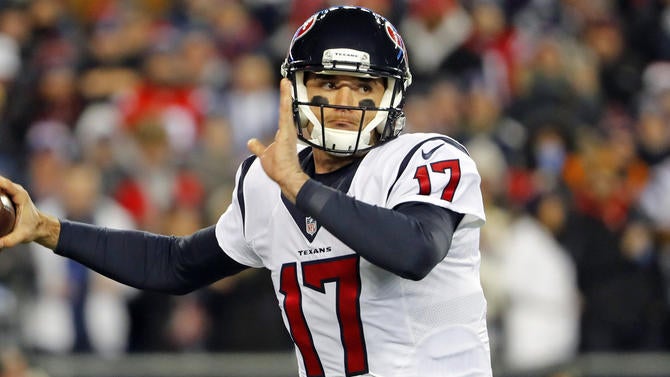
The most interesting concept mentioned was accepting less compensation back in return by requiring the acquiring team to also take Brock Osweiler’s contract off the Texans’ hands. The Texans gave Osweiler a four-year, $72 million deal containing $37 million fully guaranteed at the start of free agency last year after just seven career starts. Osweiler ranked near the bottom in a majority of major statistical categories in 2016 before losing his starting job to Tom Savage when he was pulled from Week 15’s contest against the Jaguars. Savage suffering a concussion paved the way for Osweiler to return to the lineup in time for the playoffs.
Osweiler’s $16 million 2017 base salary was fully guaranteed at the signing. His cap number for next season is $19 million. The Texans would be left with just a $9 million cap charge from Osweiler’s $12 million signing bonus by miraculously moving his contract.
This would mean a renegotiated contract averaging over $20 million per year with at least $75 million in overall guarantees.
Would Watt for Gronkowski make sense?
I also posed one specific trade scenario to the executives centered on the Texans shipping Watt to the Patriots for Rob Gronkowski, who is clearly the best tight end in football when healthy. Gronkowski can no longer be considered indispensable to New England’s success after the Super Bowl was won without him. He was lost late in the season to a back injury requiring his third back surgery. He was limited to just eight games because he was also slowed by an early-season hamstring problem.
The idea received mixed reviews.
“I can’t imagine the teams making this trade. Gronkowski’s back and injury history scares me much more than Watt’s,” said an executive.
Another executive was intrigued by it. He thought more than New England’s 2017 first-round pick (32nd overall) would be required in addition to Gronkowski for the deal to make sense for the Texans but didn’t specify what else would be necessary. Putting a franchise tag on tight end Martellus Bennett for almost $10 million or finding a replacement in the 2017 draft would have added importance if New England was willing to part ways with the four-time first-team All-Pro.
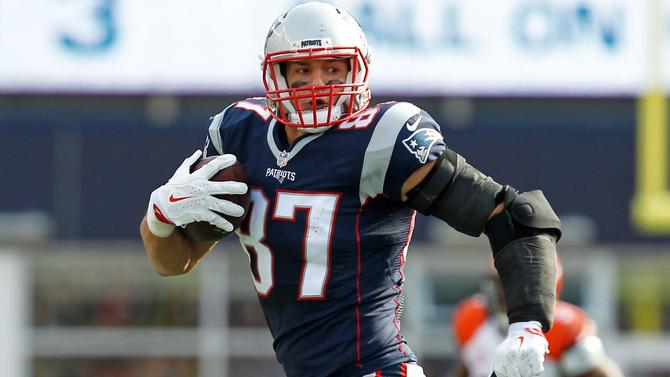
Before last season, Gronkowski was reportedly unhappy with the six-year, $54 million extension he signed in 2012 to become the NFL’s highest-paid tight end by average yearly salary. He has three years left on his contract for $24 million. Since Gronkowski’s 2017 salary is $5 million, the Texans would only be losing $500,000 cap-wise in the trade.
Taking on Watt’s contract would not be a problem for New England. The Patriots are expected to have over $60 million in cap room.
Final thoughts on any Watt deal
The odds of Watt actually getting traded are remote. The price would be too steep for most teams, especially with the uncertainty of his future performance because of his back issues. The prospect of giving Watt a new contract is additional complication.If Watt picks up where he left off when last healthy in 2015, the Texans potentially have one of the most dominant defenses in recent history. It still probably won’t be enough to turn the Texans into legitimate playoff contenders unless Houston gets improved quarterback play and the offense starts holding up its end of the bargain.










